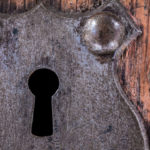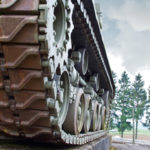-
If… My people who are called by My name humble themselves and pray and seek My face and turn from their wicked ways, then I will hear from heaven, will forgive their sin and will heal their land.
– Chronicles 7:14
King David longed to build the Temple of God for his people.
But God wouldn’t allow him the privilege because he was a man of war. David prepared the materials, however, and the task was fulfilled by his son Solomon.
When the Temple was finally completed, Solomon held a dedication for it. At the dedication, the people of Israel offered many sacrifices and the place was consecrated according to God’s instructions.
Solomon offered a heartfelt prayer to the Lord, asking God’s blessing upon the place. As he finished, the glory of God fell so heavily the priests could not enter. According to 2 Chronicles 7:1, “The glory of the LORD filled the house.”
This was God’s land and His people. The Temple was symbolic of both the Person of Jesus Christ and the coming Church, as revealed in the New Testament.
It was not representative of America.
I love the often-held idea our nation can be made whole if God’s people humble themselves and pray for America. Intercession is a good thing.
But Israel was, and is, a nation like no other. She is singular in that she was formed specifically as His own. In the Old Testament God worked with Israel corporately in the way He works with the worldwide Church today, and He has in no way renounced Israel.
No other nation except Israel did God declare to be His special possession.
The United States has been blessed, no doubt. If the symbolism of 2 Chronicles is to be applied correctly to the New Testament age, however, it means if God’s people, i.e. the Church, sins and falls into the discipline of the Lord, and the Church humbles herself and prays, then God will heal His Bride.
America is headed down a dangerous road. She desperately needs our prayers. More importantly, God’s people need to be on our knees for the Church. If we humble ourselves and pray and confess our sins, He will heal us.
If we are faithful to share the good news of the Savior, others may be turned from the path to destruction. Righteousness, we are told in Proverbs 14:34, exalts a nation. The way to help America is to lead others to righteousness.
I love my country.
It hurts me to see her so tortured by sin. We are not called to save America, though. We are called to make disciples in all nations, including this great land.
Let’s begin by praying for the Church to be all she can be. May she be healed. May the glory of the Lord fill the house.

-
And God said to Moses, “I AM WHO I AM”; and He said, “This is what you shall say to the sons of Israel: ‘I AM has sent me to you.’”
– Exodus 3:14
The car snakes past the other drivers as we jockey for position in the fast lane.
We accelerate as we leave the city limits, find our places, and settle in for the drive. I give the Jeep its head, and it glides along the river road as if by its own accord.
The old Jeep has made the trip many times. If I didn’t know better, I’d think it’s as eager to get home as I am.
My mind wanders along familiar roads, mentally sorting the day’s events into “done” and “in progress” folders. Like most Americans, I have been sucked into a vortex of busyness that consumes my days.
I am a slave to time. Too often, I get so wrapped up in doing that I forget to be. I need to still my brain. I need time with the Eternal One.
When I first began to search for God years ago, my main stumbling block to Christianity was the doctrine of the Trinity. I couldn’t accept Jesus as God. The idea of three persons in one Godhead was beyond my comprehension.
Actually, it still is. But as I began to read the Bible for myself, I was amazed at the power emanating from the pages. As I studied it, I discovered for myself why we worship the three persons of the Trinity as one God.
One of the many Scriptures that convinced me of Jesus’ deity was John 8:58.
John describes a day the scribes and Pharisees confronted Jesus as He taught in the Temple in Jerusalem. They accused him of being demon-possessed when He promised eternal life to those who believe in Him. No mere man, they correctly maintained, could offer eternity to humanity.
Jesus’ response floored me: “Before Abraham was born, I am.”
I AM was the name God used for Himself as He spoke to Moses at the burning bush, as described in Exodus 3:14. Jesus applied this title to Himself. He declared Himself to be God, the Word expressed in physical form.
I AM is the perpetual state of being. It transcends time; it has no beginning or end. I AM is to be, always. God doesn’t live forever, in the way we think of the passage of time. Time is His creation. He exists independently of time.
He lives.
In His incarnation, the Word entered time to rescue us. He has called us to pass through time and space in earthly bodies as He did, living toward eternity. He used the time given Him on this earth to walk out the plan of His Father, empowered by the Holy Spirit. His incarnation has granted us the chance to live forever.
Because He is, we are.
Eternal.

-
Then Jesus said, ‘Come to Me….’
– Matthew 11:28
We couldn’t find her all day.
P.T. has always been an independent little kitty. She’s a senior citizen in cat years, a streetwise old lady. She loves living outdoors, although she usually comes up every night to be locked safely into the large kitty kennel.
Last night, she didn’t come up to her bed and spent the entire night outside. This morning, she sauntered up for her usual breakfast. But when I walked away and turned my back for a moment, she let out a heartbreaking yowl and took off. At first, I thought she might have been bitten by a snake, since she was standing by my golden barbary bush. We have killed two snakes around that bush in recent years, a bullsnake and a rattler.
But I couldn’t find anything that may have hurt her. It occurred to me that she yowled when she tried to eat. An infected tooth, maybe?
I went looking for her and found her under the camper. Our other cat followed along and walked up to P.T., curious. P.T. batted at her and took off again.
Throughout the day, we searched for her without success. When our daughter came home from work, she hunted until she found the cat huddled under a shed. She refused to come out, even when offered her favorite food. In fact, she crawled back deeper into the corner under the shed.
We’re at a loss. Not only does she refuse to come to us, she runs away as if we’re the ones who have hurt her. We’re unable to help her until she comes to us or allows us to come to her. There’s no way to communicate to her that we didn’t cause her pain, and we can help.
Watching our kitty suffer and run from us has stirred some uncomfortable questions for me.
Do I suffer needlessly at times because I won’t allow God near me? Do I blame Him on any level for my wounds?
Why do we run from God when we hurt, and why do we refuse to let Him pick us up? What do we fear in surrendering our sorrows to Him?
Why can’t we trust Him?
P.T. doesn’t understand what is happening to her, but I know God better than this. And He deserves better than my mistrust.
Wholeness is rarely found in hiding. If you’re hurting, let God pull you out from under the shed. Or better yet, run to Him.

-
And hope does not disappoint.
– Romans 5:5
Hope lives in my yard.
It spills from baskets. It nestles in pots and peeks out from a layer of red mulch. It even inches around the rocks that line the pond at the end of the yard. At my house, hope is the thing with chlorophyll.
Every spring, my internal Eden awakens with the earth, stirred by the warm ground and the beckoning rows of new plants at the local garden shop. This year is no exception. In fact, spurred on by the prospect of an upcoming wedding, Eden has been working overtime.
This time of year teems with potential. I imagine the exotic King Tut grass I’ve carefully positioned at the west end of the little pond will look magnificent when it has filled out. I envision the red spirea playing the perfect accent to my golden barberry. The potato vine and silver falls should spill nicely from the planters when they have grown a bit.
I dream, I plant, I water, and I wait.
Then comes the hard space when dreams dissolve in the dirty reality of life.
One morning I walk out to inspect my plants and find holes where insects have eaten into the coleus. The red climbing rose falls prey to marauding deer in the night. Then hot weather hits, and I’m tethered to a sprinkler hose for the next three months. I battle weeds and bugs and weather and remember why it’s so hard to grow anything on a country hillside in northern Idaho.
I know, though, that barring a grasshopper invasion or a severe drought, at least some of my garden will survive the summer. It just takes a lot of perseverance.
I’ve been here before, in the dry space between hope and the harvest.
Years ago, Jesus saved me and gave me a commission to raise our family to live for Him. In those early years, I dreamed of what my children would be when they were grown. My husband and I planted the seeds of eternity in their hearts while we fed them, watered them, and chased away the predators.
Then came the hard years, when it seemed all I did was wipe dirty faces and comfort sick little bodies. We disciplined them, prayed for them, and wept over their struggles as they grew. In the heat of trials, I often failed them. Sometimes I wondered if I had done anything right.
My children are grown now, and I’m amazed at what a great job God has done. They all love the Lord Jesus, and I enjoy just being around them. They are wonderful people, and I love walking through the garden they are. It’s been an abundant harvest.
What seed has God planted in your heart? To what has He commissioned you? Are you in the dry space between hope and the harvest? If so, take courage. You are not forgotten, God is at work, and you will reap, if you don’t give up.
So neither he who plants nor he who waters is anything, but only God, who makes things grow.”
-1 Corinthians 3:7 (Berean Study Bible)

-
Now to Him who is able to establish you according to my gospel and the preaching of Jesus Christ, according to the revelation of the mystery which has been kept secret for long ages past…
– Romans 16:25
There is nothing more delicious than a good mystery.
My bookshelf is lined with Agatha Christie books. I have watched every sappy episode of Murder She Wrote and even recently hosted one of those murder/mystery dinners for my writer friends. I love television documentaries that explore questions about who lived on Easter Island or whether the stone megaliths found around the world are man-made or natural.
I’m constantly intrigued by why stuff happens.
The greatest mystery ever presented to mankind was the one hidden in the Old Testament. The salvation message was woven throughout ancient history like threads to some great but unknowable theme. From the moment God promised the Deliverer to Adam and Eve, those who sought out the God of Israel read and stumbled over the mystery of God’s dealings with humanity. It was like trying to piece a puzzle together without the picture on the box.
Only in the coming of Jesus Christ was the veil pulled away from the holy place and the breathtaking plan of the ages revealed.
Why the gospel had to be kept secret for millennia? Was it to keep Satan and his evil forces unaware of His plan? Was it to allow history to develop the story line God wrote for Earth? Was it to provide for every possible human social experiment to play out, revealing our inadequacies in the search for heaven?
One thing is for sure: God’s ways are not our ways. He is infinitely smarter, wiser, more faithful, more powerful, and more patient than the most perfect of His creation.
Perhaps the only way we could understand the magnitude of the message was to see it against the backdrop of our corporate and utter failure to God. Deliverance means the most to those who know they are drowning. Joy is most complete when the waiting has been long.
Understanding is appreciated more by those who have had to search for it.
…but now has been disclosed, and through the Scriptures of the prophets, in accordance with the commandment of the eternal God, has been made known to all the nations, leading to obedience of faith; to the only wise God, through Jesus Christ, be the glory forever. Amen.
– Romans 16:26, 27

-
Yet You are holy,
O You who are enthroned upon the praises of Israel.– Psalm 22:3
Praise
Is the golden elixir of the soul.
It oils our rusty relationship with God.
It reaches beyond our fears to the Deliverer.
Praise
conquers kingdoms,
hearts,
and attitudes.
Praise destroys our enemies.
When it looked as if the people of Judah were going to be crushed by an overwhelming invasion of their enemies, King Jehoshaphat knew where to run. He proclaimed a fast throughout the land, gathered together with the people in Jerusalem before the Lord, and prayed for deliverance. God answered him with these words:
Do not fear or be dismayed because of this great multitude, for the battle is not your but God’s.
Listen to me, O Judah and inhabitants of Jerusalem, put your trust in the LORD your God and you will be established.
– 2 Chronicles 20:15; 20
Early the next morning, Jehoshaphat and his army went out to meet the opposing forces. He put the singers ahead of the army. As they began singing and praising God, the Lord set ambushes ahead for their enemies. Jehoshaphat didn’t know that as they marched toward the battleground, two groups of their enemies had already fought each other to the death.
When Judah’s army reached a wilderness lookout, they found no fearsome army. All they saw in the valley below them were the corpses of their enemies.
Scattered at their feet.
Are you overwhelmed by circumstances?
Do the accusations of the enemy threaten to destroy you? Are you tired of living in defeat? Do you need deliverance today?
Meet God in the holy place. Sing His praises and recall every memorial stone along your journey with Him. Praise Him in your place of weakness. I promise that He will meet you there.
You will not be overcome.
When you pass through the waters, I will be with you; And through the rivers, they will not overflow you. When you walk through the fire, you will not be scorched, Nor will the flame burn you.
– Isaiah 43:2

-
He who is slow to anger is better than the mighty,
And he who rules his spirit, than he who captures a city.
– Proverbs 16:32
A guy pulls a gun on another customer during a dispute at a fast-food restaurant.
A teenager shoots his parents over a video game. A father kills his daughters because he feels they have dishonored the family name. These extreme stories happen with increasing frequency and highlight the destructive nature of a soul out of control.
Most of us would never consider doing anything this horrendous. Our paler version of anger still kills, though. Harsh words are effective weapons when fired at close range into the hearts of those with whom we come into contact every day.
Don’t you hate the moment you see pain in the eyes of someone you have hurt? A million apologies can never take back the violence of the blow. The wound may heal, but the scar it leaves will always be a reminder of your cruelty.
Sometimes we forget the power of words. Every day we have the power to speak life or death into another person. In our most unguarded moments, when we are feeling distinctly unspiritual, we may be presented with the opportunity to shine a light into someone’s darkness.
It will likely be when we are the most preoccupied and the least inclined to shine. When we’re wrapped up in our own needs, we’re ignoring the needs of others and are most in danger of crushing anyone who happens to get in our way.
To be effective soldiers of the cross, we must rule our own souls.
First and foremost, our war should be against our own barbarity. Before we can present the cross to others, we must first crucify ourselves.
It’s a difficult mission, isn’t it? Every day we face injustice and a lot of obnoxious people. There is never enough time, finances, or energy to accomplish everything. Under such pressure, it’s easy to get frustrated and give in to anger.
But then, Jesus didn’t call us to the easy path, did He?
Gentleness should be the mantle of all who follow the Christ. It’s the shield with which we protect others from the arrows of the enemy. If we learn to rule our own emotions and respond to others with kindness, we can be a powerful force for good.
Conquer ourselves, and we will be a true warriors for God.

-
You have fallen from grace.
– Galatians 5:4
He stands sweating in the spotlight, fending off a crush of media circling the podium at the scent of blood in the water.
His wife stands stoically behind him. A tight smile is frozen on her face, but her eyes tell the real story of betrayal: shame, disappointment, resentment.
You’ve seen it before. It’s become commonplace for both Christian and secular celebrities to be found straying from their public image. The words “fallen from grace” evoke images of disgraced televangelists and sleazy elected officials.
You know, the people in the gutter.
The phrase “fallen from grace” is often used for folks like these, especially if we’ve decided they just lost their salvation. There is, however, only one place in the Bible where the phrase “fallen from grace” is used. That reference has nothing to do with those who have sinned beyond possibility of redemption.
But if Paul wasn’t talking to the backslider, to whom was he talking?
This is the entire verse:
You have been severed from Christ, you who are seeking to be justified by law; you have fallen from grace.
– Ephesians 5:4
The letter to the church in Galatians addressed a particular problem plaguing the early Christians. False teachers had arisen, insisting that Gentiles who wanted to convert to Christianity must first become Jewish followers and practice the Mosaic law.
Paul argued that forcing believers to live under the Law of Moses sentenced believers to a life of working to earn their salvation. This practice sidesteps the acknowledgement of our inability to fulfill righteousness on our own and voids the sacrifice of Christ. Without Christ’s redemption, there is no grace.
Mankind proved his inability to keep the Ten Commandments long before Jesus Christ was born.
From Adam on down through the generations, every single human failed to obey God’s Word. No perfect man lived who could fulfill the law.
So God did it Himself. His sacrifice ransomed us from the grip of Satan and sealed us in a new covenant.
In the book of Galatians, Paul argues Christ has freed us from the Law of Moses. We now live in an age of grace, a glorious – and undeserved – favor bought for us with Christ’s blood. Sinning grieves God, but it does not result in a fall from grace. Indeed, it magnifies the need for it.
Is it possible to fall from grace? Yes, it is if we seek to circumvent it by attempting to please God without Christ.
It’s cruel and judgmental to take away the hope of those who have given in to sin by stamping them with words meant for those who want to enslave us again to the law. Instead, let’s encourage each other to fall into grace, headlong, with gratitude and joy.
It was for freedom that Christ set us free; therefore keep standing firm and do not be subject again to a yoke of slavery.
– Galatians 5:1

-
Behold, I send you out as sheep in the midst of wolves; so be shrewd as serpents and innocent as doves.
-Matthew 10:16
My witty, irreverent aunt lived her entire life in the deep South.
She worked for many years as a registered nurse and taught nursing until her death from cancer at an early age. Her storytelling abilities were legendary. I would sit spellbound and listen to the tales she wove of her exploits working the wards.
Toward the end of her life, she struggled with a difficult relationship. Her greatest frustration was to be blindsided by a new issue. My mom and I traveled back down south to visit the family one year. I remember the three of us sitting at Aunt Mil’s table as she shared in colorful detail the emotional pain she had endured in recent months.
“I’m just trotting along, picking my pawpaws and putting ‘em in my basket,” she said, “when all heck breaks loose.”
Translation: “I’m just going along, happily minding my own business, when I’m ambushed by this person.”
Difficult relationships can make you feel like you’re surrounded by the bad guys. But who really is your enemy? Not people, of course. Especially not the people you love.
Our enemy is the devil, that ancient liar and thief, shrewd student of human nature.
Although he isn’t omnipotent or omniscient, he could easily conquer every one of us if it wasn’t for Jesus. The devil is a vanquished enemy, but a formidable foe.
Much of our defeat in our spiritual lives and relationships can be traced back to our own ineptitude in recognizing and dealing with him. Satan loves nothing more than to divide people and convince us to hurt each other. Are you aware of the spiritual warfare waged around you? Do you know the true nature of the emotional battles that consume you?
The Bible tells us that victory is possible. I haven’t arrived there yet, but I know God has given us strategies for success:
Live like a soldier, armed and alert to perils ahead.
Resist the temptation to be lured into a trap.
Learn to respond to every insult lobbed at you instead of reacting instinctively by attacking back.
Discover the emotional buttons that set you off and work on disarming those triggers.
Strive for authenticity in your relationships. Be the person you want others to be.
And do not give the devil an opportunity.
– Ephesians 4:27

-
You are the God who performs miracles.
– Psalm 77:14 (God’s Word Translation)
For the last couple of years, our family has been hit with a series of losses.
We said a last goodbye to several beloved family members and friends. Gains in other areas of our lives were reversed; our days loaded with new burdens.
I sometimes found myself dreading what the next day might bring. I could feel myself wearing out emotionally and physically. About the time I had resigned myself to loss, something changed.
A page turned.
It was a whisper, like when the wind catches the parchment-thin page of an old book. We turned an unseen corner, and a new chapter blew open in our lives. One after another, prayers that I had been sending to God for many years were answered with a resounding yes.
These were not your run-of-the-mill prayers. They were the “stone rolled away from the tomb” prayers, crazy prayers needing an absolute miracle to come to pass. They were desperate petitions, breathed with tears in the night for many years.
It may only be April, but for us spring came last fall. Our world began to thaw just as the first frost settled on the garden. Now, as the earth stirs to life and we watch renewal bloom around us, I remember God is not a principle or a life force. He is spring.
He is real. He is alive. He cares.
Today I proclaim to you that God still works miracles. He parts seas and moves mountains. He calls the dead to life and heals our wounds. I know because I have seen it.
Do miracles still happen?
Absolutely.
Behold, I am the LORD, the God of all flesh; is anything too difficult for me?
– Jeremiah 32:27

-
Jesus answered and said, “It is written, ‘Man shall not live by bread alone, but by every word that proceeds out of the mouth of God.’”
– Matthew 4:4 (Jubilee Bible 2000)
She sits nervously in the seat of the kiddie roller coaster, not comforted by the arms encircling her.
The ride clacks along the rail as her tension builds. She knows what is coming, and she scrunches her eyes tightly against it. The car tips downward and rushes toward the ground.
As the other children whoop around her, she screams.
“PONIES! I love ponies, and I’m not afraid to admit I love unicorns! I love ponies and unicorns! U..NI..CORNS!”
You may have seen the video of this little girl on America’s Funniest Home Videos. You may have snickered at her childish reaction. But you know you’ve been there. Life careens downward and your brain runs screaming irrationally to the first safe place that comes to mind. At least, I’m pretty sure yours does, because that little girl and I can’t be the only ones who bolt for the emotional trap door when life gets scary.
Unicorns would be the natural place to run for little girls, because they’re beautiful and magical. When we grow up, though, our hiding places change. We can’t swallow stories about one-horned horses that fly. In fact, Bible critics point to references to unicorns in older versions of the Scriptures as one reason the Bible is a nothing more than a collection of myths. I have news for them, though.
Unicorns are real.
At least, the Siberian unicorn is.
A well-preserved skull of an extinct rhinoceros has been unearthed near the village of Kozhamzhar in the Pavlodar region of Kazakhstan. This rhino is actually Elasmotherium sibiricum, a rhinoceros which was previously thought by secular scientists to be long extinct before man appeared on the earth. It is believed the Siberian unicorn could grow to be about 6.7 feet tall and 15 feet long. Evidence now indicates that the unicorn lived alongside humans, according to an article published in the February 2016 issue of the American Journal of Applied Science.
So what is the “unicorn” spoken of in older versions of the Bible? The confusion appears to originate with the evolving definition of the word “unicorn.”
The current Webster’s New World Dictionary defines the word as “a mythical horselike animal with a single horn growing from its forehead.” But Noah Webster’s American Dictionary of the English Language of 1828, however, defined a unicorn as “an animal with one horn; the monoceros.”
A study of the Scriptures using the term “unicorn” confirms the fearsome qualities of an animal more resembling a rhinoceros than a one-horned horse. It’s another example of how our misconceptions of the Bible keep us from believing it.
It’s easy to miss the truth when we have our eyes closed and we’re screaming the first thing that comes to our minds.
I’m not afraid to admit I love ponies and unicorns and most of the rest of God’s creatures. But when life gets scary, you’ll find me running to God’s Word for help.
And I’m not afraid to admit it.
For further study:
Unicorn-A mythical horselike animal with a single horn growing from its forehead.
–Webster’s New World Dictionary
- an animal with one horn; the monoceros. this name is often applied to the rhinoceros.
-Noah Webster’s American Dictionary of the English Language of 1828
The beautiful title “Siberian unicorn” belongs to Elasmotherium sibiricum – an elasmotherium Siberian rhinoceros, which as previously thought became extinct 350,000 years ago. Nowadays the researchers of Tomsk State University (TSU) decided the “unicorn” found his last refuge “only” 29,000 years ago in Kazakhstan. The article, describing the new location of the fossil mammals in the Pavlodar Irtysh, was published in February 2016 in the American Journal of Applied Science.
From the King James Version:
Job 39:9-12
Psalm 22:21; 29:6; 92:10
Isaiah 34:7
Numbers 23:22; 24:8
Deut. 33:17
Job 39:9, 10

-
There is one body and one Spirit, just as also you were called in one hope of your calling; one Lord, one faith, one baptism, one God and Father of all who is over all and through all and in all.
– Ephesians 4:4-6
It’s the gospel proclaimed all over again.
It’s Easter morning and life pushing up out of the dead ground. Baptism not only commemorates the death of all that is old in our lives, it celebrates the eternal life God gives us in Christ Jesus.
Baptism is the outward symbol of an inward transformation when a person is brought up out of the old life in the resurrection power of God. In this simple, yet gigantic step of obedience, baptism becomes a powerful witness to the magnitude of God’s work in us.
At the baptism of every new believer, you can hear the low rumble of a stone being rolled away from another tomb.
Once again, the earth shakes before the unstoppable power of a life that can never be quenched.
The power of Jesus’ resurrection, in destroying death “from the inside out,” as one songwriter put it, shook the very foundations of the world. The spiritual tsunami it created two thousand years ago has circled the earth and rises up again in all its power every time another person bursts forth out of the watery grave and takes a first deep breath in the new air of God’s holy presence.
This Easter, we will once again visit an empty tomb and rejoice in God’s victory over death. We will remember how Christ’s resurrection sealed for eternity all He gained on the cross.
We who follow Him to the cross will live with Him forever. We who trust in Him can no more be held by death than He was.
We will rise again. We are eternal in our dying, victorious in our surrender.
Death, burial, resurrection: Every spring shouts the miracle. Every baptism declares it.
Have you been baptized?
Photo courtesy Erik Thorson (2016)

-
For though we walk in the flesh, we do not war according to the flesh, for the weapons of our warfare are not of the flesh, but divinely powerful for the destruction of fortresses.
-2 Corinthians 10:3-4
A stronghold is the thing you give in to in the darkness.
Not long after God’s people entered the Promised Land, they were given their first test of faith. God revealed a stronghold of Satan to Joshua and commanded the Israelites to go up against it.
All strongholds have names. This one was called Jericho. Some more familiar to us are Anger, Lust, or Drug Abuse. It’s the thing you give in to in the darkness, the immovable wall between you and freedom.
The thing that controls you.
You hate it because you love Jesus. You want to serve Him with all your heart. But the craving for sin keeps you within its walls. You feel lonely and abandoned, yet you choose satisfaction over victory.
God is waiting to flatten those walls. When Joshua and the people of Israel stood before the fortress of Jericho, they must have felt very small. The temptation to walk away from the battle must have been huge. But Joshua believed in the promises of God. He believed God wanted them to conquer this place.
And He did.
God gave them specific and strange orders for the conquest of this fortress. He told them to place priests with trumpets and the ark of the Lord among the men of war and circle the city once a day for six days while blowing the trumpets. On the seventh day, they were to march around the city seven times and give a mighty shout at Joshua’s command.
This was not conventional warfare. But Joshua obeyed God’s instructions carefully, and the walls fell before them.
Joshua’s next attempt at conquering a city would fail, however, because he didn’t listen to the word of God concerning sin in the camp. This failure would cost many lives and cause much heartache to His people.
There is no magic formula for conquering our enemies, save one.
Israel’s enemies scattered when Israel listened to God and obeyed Him. For us, as well, the secret to victory is in warring according to the Spirit. We can’t fight and win by trying hard. We win by surrendering to God. We are promised His weapons are supernatural, powerful, and more than adequate for destroying the fortresses the enemy has built around all that belongs to us.
Do you want victory in your life?
Read God’s Word. Listen. Surrender. Pray. Obey.
Repeat.
If you feel weak, that’s a good thing. God’s Spirit will be your strength and your conqueror. If you love Jesus, you are stronger than your walls.
Let Him conquer your fortresses today.

-
By faith Noah, being warned by God about things not yet seen, in reverence prepared an ark for the salvation of his household, by which he condemned the world, and became an heir of the righteousness which is according to faith.
– Hebrews 11:7
Do you ever feel invisible?
Does it seem like your struggles to live a life of faith are in vain? Do you feel your life doesn’t matter?
Imagine how Noah felt. Sure, we know now what an important job he had. But although he’s remembered for building a boat that survived a worldwide flood and rescued humanity, he lived hundreds of years in obscurity before even being given the job. He labored many years working on a project to save his family from a catastrophe unimaginable to his generation, in a world that had probably never seen rain before.
During his lifetime, he endured a society so wicked “every intent of the thoughts of [mankind’s] heart was only evil continually.” (Genesis 6:5) That had to make for awkward conversations with the neighbors.
But Noah soldiered on. He listened to the word of his God. And he obeyed, even when no one cared. On a planet filled with rebellion, his was the knee who bowed to its creator. As others wallowed in their pleasures, he worked. He endured the evil and labored to obey His Lord.
He must have felt very alone.
There would be no recognition of his sacrifices from the world. But between the dawn of an everyday morning and a flood of destruction, he stood as the symbol of deliverance, the hand reaching out to a planet that had signed its own death warrant. His faith was witness to their sin, a witness to God’s heartbreak. His obedience saved mankind from extinction.
This is our reminder to arise and obey the voice of God every day.
He alone knows where we stand between an everyday morning and a world’s destruction. He alone can save us. Our faith is witness to the wrongs of an evil generation and testament to the righteousness of our Savior.
Does your life matter? You bet it does.

-
The Lord turned and looked at Peter. And Peter remembered the word of the Lord, how He had told him, ‘Before a rooster crows today, you will deny Me three times.’ And he went out and wept bitterly.
– Luke 22:61-62
He was hot, and he was cold, but the fisherman named Peter was never lukewarm.
This mercurial disciple of Jesus, whose passion was only matched by his volatility, either walked on water or sank in the waves. This man didn’t tread water. His talent seemed to lie in rocking the boat, not riding out the storms.
He usually said and did exactly the opposite of what was prudent. He was fearful in the storm while the Master was at rest and slept in the garden of Gethsemane while Jesus agonized. His intentions were good, but his impetuous actions ultimately caused him much grief.
But God loved him.
On the evening of Christ’s arrest, Peter swore to follow Jesus to prison and the grave. Only a few hours later, he denied even being His follower. He learned the hard way rash words can’t be taken back. One look from his Master pierced him through with the knowledge of what he had done.
I know that look because I’ve denied Jesus many more times than Peter’s mere three. I may not say the actual words, but through my thoughtless actions and words, I hurt God.
I see His pain in the eyes of people I have wounded. I feel His gentle reproach in my own grief at my failings. I relive my sins over and over, awash in regret.
And yet, God loves me.
The passion of the disciple, once redeemed, propelled him toward a powerful ministry. He was priviledged to witness the resurrected Christ. He became a pillar of the early church, and he eventually fulfilled his vow to follow his Master to prison and death.
I believe that every time Peter heard a rooster crow, he was reminded of that awful moment he looked into the wounded eyes of Jesus.
The memory of his failure surely cemented his resolve to serve his Savior with his whole heart.
Can we live a life without regret? Probably not, because we all fail God in some way. But as Peter discovered, regret can be a powerful reminder of how much it hurts to sin. It can be a potent force to encourage us to seek out redemption and restoration. Grace is reserved, after all, for the undeserving.
Because God loves us, He still seeks us out in our darkest night and reminds us we are His.

-
The LORD is my rock and my fortress and my deliverer,
My God, my rock, in whom I take refuge.
– Psalm 18:2
The school bus groaned to a stop, flung open its doors, and belched out two children.
The boy bounded up the driveway to freedom like a foal let out to pasture.
The girl followed slowly up the gravel driveway toward home, lugging an armful of schoolbooks and a flute case. Her small shoulders sagged under the weight of unseen sorrows inflicted during a long day at school. She was never smart enough, pretty enough, or bold enough to survive the hall gauntlet with her soul intact.
Because she was little for her age, she was an easy target for the school bullies. The boy with whom she was eternally paired in class because their last names were in alphabetic association made her life miserable. The girls weren’t much better. Her parents fought to make the school stop the bullying, but that just made it worse when the kids found out.
Day in, day out, the assaults continued. There was no place to turn, no way of escape.
At the house she dumped her books on her bed, changed her clothes, and retreated outside into the sunshine. She found her calico cat Roseanne, scooped her up, and headed for her favorite old apricot tree. She shinnied up the tree with the cat and curled up in its rough branches. There, in her refuge, she held Roseanne against her face and let the tears fall.
The little girl was me, and that old apricot tree was my refuge.
I eventually outgrew the tree, and my kitty died, but my search for refuge continued. I married a wonderful man, built a lovely home, and had five amazing children. Ultimately, though, I discovered what I really needed was a refuge transcending time and relationships.
I needed God.
Finding Him has given me the safe place I longed for all my life. In Him I have found unconditional love, eternal life, and a place to run when this world gets ugly. For all who are tossed around by the inhumanity around us, He is the rock, the fortress, our apricot tree.
In return, He has called us to reach out to others in His name. Only Christ is the true fortress, but we can offer His compassion and strength to those who are hurting. Our spouses, children, friends, and families should feel safe with us. Our homes can be shelters from the storms. Our hearts can be the place to where others want to run.
Like the old tree, our branches can cradle and comfort those who suffer, until they find their God.
Because of the devastation of the afflicted, because of the groaning of the needy, Now I will arise,’ says the LORD; ‘I will set him the safety for which he longs.’
-Psalm 12:5

-
For every house is built by someone, but the builder of all things is God.
– Hebrews 3:4
The last few years we’ve been tearing into our aging log home to give it some new life.
Raising five children took its toll on the place, and it’s been looking tired. But there’s one thing I know: it may be looking worn in places, but it’s solid right down to the foundation.
How do I know that? Because I know who built it. My dear carpenter husband poured that foundation himself, and he builds things to last.
He made the foundation walls especially strong because he knew we were going to build a log home on top of them. He made sure the logs had the support they needed to stay together through the storms, winds, and weight of the roof. He envisioned the result and built the house to fit those specifications.
I know another carpenter, too.
This builder doesn’t work with wood. He works with flesh, heart, and spirit. He doesn’t build houses. He builds lives.
Since He’s a great designer, too, He envisioned the result before He ever started and set a foundation lasting forever. How appropriate that when He came to earth, He took the form of a carpenter’s son!
His foundation is cemented in the forgiveness He won for us through His sacrifice on the cross. Hewn into the solid rock of eternity, it’s upon this place we build our house of faith.
“Now if any man builds upon the foundation with gold, silver, precious stones, wood, hay, straw, each man’s work will become evident; for the day will show it because it is to be revealed with fire, and the fire itself will test the quality of each man’s work.”
-1 Corinthians 3:12-13
The materials may differ, but each person who has chosen to accept Jesus Christ into his life is building a living temple. Our souls are the altars upon which we daily offer the sacrifices of a broken heart.
Here we give our dreams, hopes, and desires to Him. From here our prayers rise like sweet incense in the holy place. Here the veil is torn between the place God dwells and the outer court.
Here, man walks with God once again.

-
Remember that you were at that time separate from Christ, excluded from the commonwealth of Israel, and strangers to the covenants of promise, having no hope and without God in the world.
– Ephesians 2:12
ATHEOS, Atheist: godless; destitute of God; given up by God and excluded from communion with God*
What is an atheist?
The famous musician David Bowie once said:
I’m not quite an atheist and it worries me. There’s that little bit that holds on: ‘Well, I’m almost an atheist. Give me a couple of months.’**
The chance to decide ended for David Bowie on January 10, 2016, when he passed away from the ravages of cancer.
Bowie used the term “atheist” in its popular context, meaning someone who has rejected God’s existence and is therefore free to live without restraint or guilt.
The Biblical definition of “atheist” is much different. The apostle Paul penned the letter to the Ephesians, Gentile believers in Ephesus, who had formerly been pagans. Here the word for “without God” is atheos. These people had previously worshipped gods. They believed. Just not in the right sovereign.
According to Paul, an atheist is not someone who has arrived to a higher plane of consciousness and has no need for a god. He is a person who has been given up by God and excluded from communion with Him. It is a person lost, riding a wave of nothingness into oblivion.
There is a mournfulness about this Scripture. You can almost feel God’s grief.
Atheists are empty. Destitute. Hopeless.
But it doesn’t have to be this way.
I hope Bowie made the right decision in his final hours, because no one should live in spiritual poverty. God is always willing to fill that void. When the reality of our mortality shakes our world, when the questions outnumber the pat answers we’ve always conjured up, He is waiting to reveal Himself to us who are atheos, without God, in the world.
He will fill us with life and hope and a secure eternity. There is no need to worry in the night, when no one is listening to our bluster, and the fear outweighs the ego.
Are you an atheist? There is hope.
*Vine’s Expository Dictionary of New Testament Words, pp. 491-492
**http://www.brainyquote.com/search_results.html#tdwVQZBSQQG7wqrr.99

-

-
The refining pot is for silver and the furnace for gold,
But the LORD tests hearts.
– Proverbs 17:3
One year just after Christmas, my brother’s home burned to the ground.
Virtually nothing was saved except for a few wedding photographs that miraculously escaped the flames. In tears I watched him and his wife dig carefully through the ashes for any shred of their possessions.
Fire is terrible in its power to completely purge our lives. It’s no wonder God employed this element as a symbol of His cleansing.
In his booklet Comfort for Troubled Christians, J.C. Brumfield explains how the ancient silversmiths extracted silver from the ore. In the old days, a smithy heated silver until the pure element separated from the worthless dross. To do this, he placed the raw silver ore into a kettle and built a fire under it.
As the fire burned hotter and hotter, the silversmith stayed close by and watched it so the silver wouldn’t overheat. When the ore reached the right temperature, the dross started to separate from the silver and rise to the surface. The smithy then skimmed the dross off the surface. This process continued until the silver was purified.
You know where this is going. God is our Holy Silversmith; trial is the fire He builds under the kettle of our existence, and the intense heat is God’s way of getting those raw, ugly imperfections in us to rise to the surface. When we acknowledge and repent of these sins, they are removed, and we are purified.
It is comforting to know God doesn’t cook us forever.
The silver is only heated until it’s ready for use. How did the refiner know when to take the kettle off the heat?
He knew the refining was finished when he could look down into the kettle and see his reflection in the surface of the silver. We, too, must undergo the fire until our lives shine with the reflection of God’s image, and we are ready to be used by Him.
When the fire is intense, and it feels like the trials will never end, we can be assured God has not abandoned us; in fact, He’s very near. He’s watching us carefully. He’s removing the impurities thoroughly.
Patiently, He’s waiting… to see His reflection.
For You have tried us, O God; You have refined us as silver is refined.
-Psalm 66:10





















